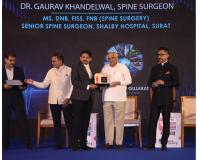How ToEnsure Complete Nutrition?

To ensure complete nutrition, consume a balanced diet rich in fruits, vegetables, whole grains, lean proteins, and healthy fats. Stay hydrated, limit processed foods, and consider supplements if needed. Regularly monitor your diet to meet essential vitamin and mineral requirements.
New Delhi [India], March 25: Proper nutrition is the foundation of good health, helping the body function optimally and preventing deficiencies. A well-balanced diet provides all essential nutrients, ensuring overall well-being. If you struggle to meet your daily nutritional needs, consider taking supplements like an A to Z tablet, which contains vital vitamins and minerals to support a healthy lifestyle.
1. Eat a Balanced Diet
Complete nutrition can be maintained by consuming a balanced diet. It should include a variety of food groups to provide all essential nutrients.
- Fruits and Vegetables: Rich in vitamins, minerals, fibre, and antioxidants, these support immune function and digestion. Try to have at least five portions per day.
- Whole Grains: Brown rice, whole wheat, oats, and quinoa provide fibre, energy, and essential nutrients. Replace refined grains with whole grains for better nutrition.
- Proteins: Include lean meats, poultry, fish, eggs, dairy, legumes, and nuts to support muscle growth and repair. Vary your protein sources to gain a wide range of amino acids.
- Healthy Fats: Sources like avocados, nuts, seeds, and olive oil provide essential fatty acids crucial for brain and heart health. Omega-3 fatty acids from fish are particularly beneficial.
2. Stay Hydrated
Water plays a crucial role in overall health, aiding digestion, circulation, and toxin removal.
- Aim for at least 8-10 glasses of water daily.
- Include hydrating foods like cucumbers, watermelon, and citrus fruits.
- Limit sugary drinks and caffeine, which can lead to dehydration and energy crashes.
3. Prioritise Micronutrients
Vitamins and minerals are essential for numerous bodily functions, from energy production to immune support.
- Iron: Found in leafy greens, red meat, and legumes, it prevents anaemia and boosts energy. Pair plant-based iron with vitamin C for better absorption.
- Calcium and Vitamin D: Essential for bone health, sourced from dairy products, fish, and sunlight exposure. Consider fortified foods if you have dietary restrictions.
- B Vitamins: Support metabolism and brain health, found in whole grains, eggs, and nuts. These are crucial for energy production.
- Zinc and Magnesium: Help in immune function, found in nuts, seeds, and seafood. Magnesium also supports muscle and nerve function.
4. Maintain a Healthy Gut
A healthy gut ensures efficient digestion and absorption of nutrients.
- Include probiotics like yoghurt, kefir, and fermented foods to enhance gut flora.
- Eat fibre-rich foods such as whole grains, fruits, and vegetables to support gut bacteria and digestion.
- Avoid excessive processed foods, artificial sweeteners, and alcohol that can disrupt gut balance.
5. Plan Your Meals
Proper meal planning helps ensure you get all essential nutrients daily.
- Prepare nutritious home-cooked meals to avoid unhealthy takeaways.
- Ensure every meal contains a mix of protein, healthy fats, and fibre for sustained energy and fullness.
- Avoid skipping meals, as it can lead to energy loss and overeating later. Eating at regular intervals supports metabolism.
6. Consider Nutritional Supplements
It is difficult to meet all nutritional needs even with a healthy diet. A daily A to Z tablet may help fill in the gap to supply the necessary vitamins and minerals needed for overall health, particularly for those with dietary restrictions or busy lifestyles.
7. Exercise Regularly
Physical activity enhances nutrient absorption and overall well-being.
- Follow a daily routine to exercise for no less than 30 to 45 mins.
- In order to improve fitness in general, include a combination of cardiovascular, strength training and flexibility exercises.
- Stay hydrated and eat a balanced post-workout meal for recovery, including protein and healthy carbohydrates.
8. Get Enough Sleep
Repair and nutrient absorption are needed by the body, and this is even more important for quality sleep.
- Aim for 7-9 hours of sleep each night to support overall health.
- Avoid excessive screen time before bed to improve sleep quality.
- Maintain a consistent sleep routine to regulate your body's clock and improve energy levels.
9. Limit Processed Foods and Sugary Drinks
Highly processed foods and sugary drinks can lead to nutrient deficiencies and health issues.
- Reduce fast food, sugary snacks, and fizzy drinks, which can contribute to obesity and diabetes.
- Opt for fresh, whole foods instead of packaged items, as they provide more nutrients and fewer additives.
- Check food labels to avoid excess sugar, sodium, and unhealthy fats that can negatively impact health.
10. Listen to Your Body
Your body gives signals when it lacks essential nutrients. Pay attention to these signs and adjust your diet accordingly.
- Watch out for fatigue, hair loss, brittle nails, frequent illnesses, or poor concentration, as these may indicate deficiencies.
- Consult a nutritionist if you experience persistent health concerns to tailor a diet plan that suits your needs.
- Regularly review your diet to ensure you are getting adequate nutrition and make adjustments as needed.
Conclusion
Ensuring complete nutrition requires mindful eating, hydration, regular exercise, and good lifestyle habits. While a balanced diet is the best approach, supplementing with an A to Z tablet can help fill nutritional gaps and support overall well-being. Prioritise your health by making informed dietary choices and maintaining a wholesome lifestyle.






